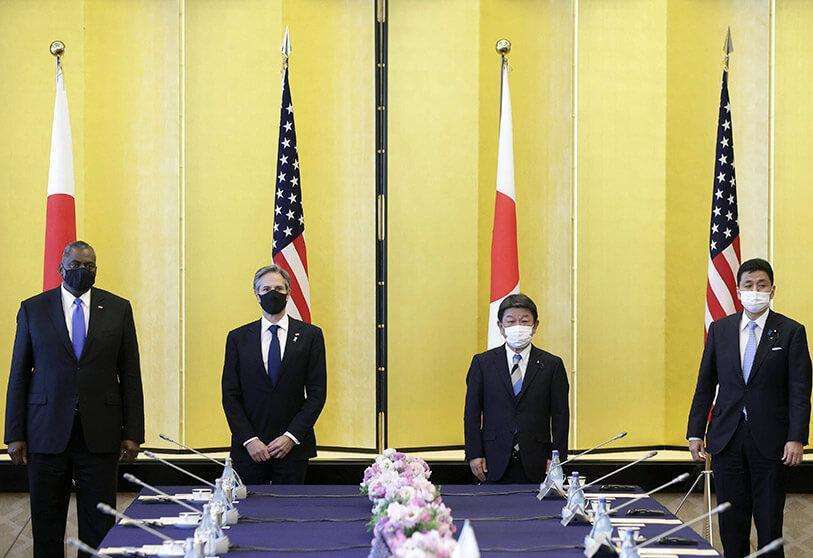US looks to Asia-Pacific region after Afghanistan withdrawal

The US withdrawal from Afghanistan could spur a greater US presence in the Asia-Pacific region to counter the influence of China, which will grow stronger economically under Taliban rule. The withdrawal of the last troops from Kabul will allow Washington to focus more on other Asian countries that, like the US, are seeking to halt Chinese expansion.
Proof of this is the recent trip by US Vice President Kamala Harris to Southeast Asia in the midst of the Afghan crisis. Harris began her tour in Singapore and will later travel to Vietnam, with the aim of strengthening relations with this "vital" area for the Biden Administration. According to a White House communiqué, this visit "focuses on the future, not the past" of an area that is "strategically and economically important to Washington". The text also notes that China disputes US political influence and naval dominance in the Indo-Pacific. "Following the withdrawal from Afghanistan, the US is refining its approach to Southeast Asia," says Julie McCarthy, US public radio's Asia correspondent.
Harris's trip comes on the heels of the largest US military exercises since the Cold War era in the Western Pacific. These exercises, dubbed Large Scale Exercise 2021 (LSE) aim to "provide high-level training at sea and on land against a challenging adversary gate". The operations involved Navy and Marine Corps commands, five fleets and three Marine Expeditionary Forces. Thirty-six ships, including aircraft carriers and submarines, were used, RT reports. Such a deployment of US naval forces has not been seen since the 1981 NATO operation Ocean Venture.

Prior to the vice president's visit to several Asian countries, US Secretary of Defence Lloyd Austin met with his Singaporean counterpart, Ng Eng Hen, in late July. The two sides reaffirmed their bilateral defence relations and military cooperation. They also committed to greater partnership in cyber defence and strategic communications. Austin also travelled to Vietnam to address the territorial standoff with China.
"Unfortunately, Beijing's reluctance to peacefully resolve disputes and respect the rule of law is not just on the water," the defence secretary said. "We have also seen aggression against India... destabilising military activity and other forms of coercion against the people of Taiwan, and genocide and crimes against humanity against Muslim augurs in the Xinjiang region," he added. Chinese foreign ministry spokesman Zhao Lijian called Austin's remarks "slanderous" and accused him of "meddling in China's internal affairs and sowing discord between regional countries in order to serve his own geopolitical interests". In Hanoi, Austin agreed, as in Singapore, to strengthen military cooperation with Vietnamese Defence Minister Phan Van Giang.

Austin also travelled to the Philippines, where he met with President Rodrigo Duterte. The Philippine president took advantage of the US politician's visit to announce that he would maintain his military troop visitation agreement (VFA), which involves the continuation of large-scale combat exercises with the United States.
All these meetings and military engagements are aimed at increasing US presence in the region as a counterweight to China's influence. Beijing has territorial clashes with countries such as the Philippines and Vietnam, which are supported by Washington through military cooperation. Faced with the US moves, Beijing has urged the US to stay out of what it considers "a purely Asian dispute". In addition to the South China Sea dispute, Joe Biden said he would work with Japan and South Korea on the Taiwan Strait, another focus of conflict in the region.
As Kurt Campbell, the White House's senior Asia adviser, pointed out, a historic shift in US foreign policy is underway, shifting the focus from the Middle East to Asia, where China's recent power "has overshadowed Washington's allies".

Washington's ambition to expand its influence in the area also led Secretary of State Antony Blinken to meet with Indonesian Foreign Minister Retno Marsudi in early August. The politicians pledged to cooperate on the defence of the South China Sea.
Blinken also discussed with his Indian counterpart, Subrahmanyam Jaishankar, "strengthening their partnership to deliver stability and prosperity in the Indo-Pacific area". India has been at loggerheads with China over the Himalayan border since the 1962 Sino-Indian war. "We believe we can achieve a lot together on many fronts, and even in the short term," Blinken said.
Joe Biden's China policy follows the same path set by his predecessor, Donald Trump. For both presidents, the Asian giant is "a strategic competitor" that poses a number of challenges. The countries of the region generally reaffirm this point. Although there are differences between each nation's policy towards China, none of them wants Beijing to dominate the region's order. For example, Laos or Myanmar are highly dependent on China's economy, as well as sharing a land border, and thus seek to avoid conflict with their large neighbour.

Recent developments in Afghanistan, coupled with the US's poor reputation in the Middle East region for military interventions, could mean a shift in Washington's foreign policy towards the Asia-Pacific region to confront its major competitor, China.








